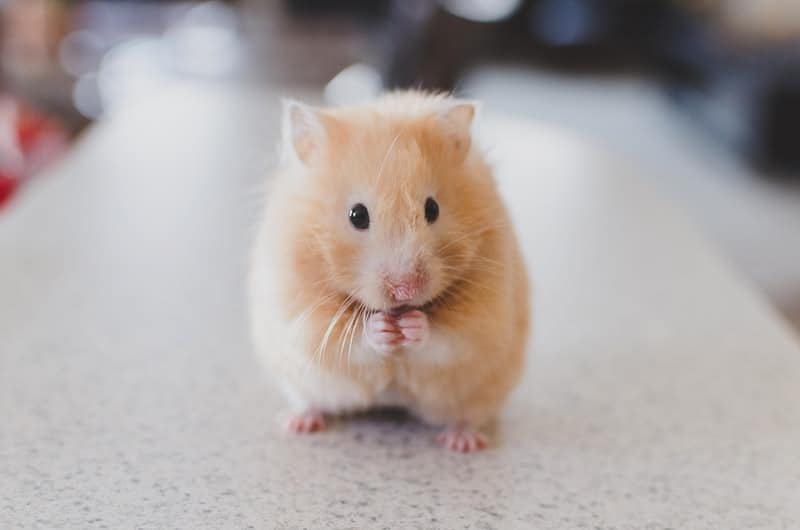Hamsters are among the most popular pets in the world. Their pocket-sized format, adorable appearance, and easy-going nature make them excellent companions. However, before getting a pet hamster, there are a few questions you must ask yourself. One very important question that many people have is: Do hamsters smell?

It’s a good question, unpleasant smells can quickly sour the relationship between you and a pet. Because hamsters are rodents, many people are under the impression that they’re dirty, stinky animals. How true is this really? Do they really stink up an entire room or do they actually smell quite good and is it an unfair stereotype? We’ve done the research (and added some of our own personal experience) to give you the most detailed answer possible.
Do hamsters smell bad naturally?

Hamsters themselves do not smell bad. Of course, like all animals, they do have their own unique natural smell but it’s not a bad odor at all.
The main reason why hamsters generally do not smell bad is that they’re incredibly clean. These little rodents spend a remarkable amount of time every day grooming themselves to ensure that their coat stays sparkling clean.
Because they’re such clean animals, you do not need to worry about bathing your hamster either. In fact, it’s quite important that you do not bathe your hamster at all. Not only does bathing wash away important natural oils, which actually makes them dirtier, but it can also make your hamster sick!
If you do want to help your hamster stay clean, Dwarf hamsters such as Roborovskis and Winter Whites sometimes enjoy having a sand bath to help keep themselves clean.
3 Reasons why your hamster might smell
Nevertheless, while hamsters are naturally clean animals, it is true that they do smell sometimes. However, the reason why they might smell is often misunderstood. There are 3 major reasons why your hamster can have an unpleasant odor. Let’s take a look at each of them and how you can prevent them from happening.
1. Hamsters & Bad Smells: Urine!
While hamsters generally do not smell bad, many people who’ve been in the vicinity of hamsters report bad smells, why is that?
One of the major reasons why people are sometimes under the assumption that hamsters smell is because their urine can definitely smell quite bad. Their urine often does not smell pleasant even when they’re young and healthy, but in older and sickly hamsters, this odor can get even worse. It can have a distinct smell of ammonia that’s not very pleasant.
The reason why their urine smells bad is simple: it’s one of the ways they get rid of waste from their body. Of course, this is not limited to hamsters. No animal has urine that smells like flowers!
To prevent the smell of urine from stinking up their cage, you can actually litter train your hamster. They’re intelligent little rodents and are smart enough to be taught how to use a litter box! Once you’ve taught them how to use a litter box it makes keeping smells away much easier because you can simply refresh their litter box every day.
2. Female Hamsters in Heat: The Smell Effect
In many cases, people report smells from their female hamsters. They notice that their female hamster starts to smell every few days for a couple of hours. The smell can be quite bad and is often described as being strong, musky, and pungent. The smell often only lasts for a couple of hours before it disappears, only to reappear a few days later. This can be very confusing for hamster owners, luckily, there is a simple explanation for this phenomenon
You see, female hamsters go in heat once every few days. Being in heat means that they’re ready to breed and create a baby hamster. To make it known that they’re ready to breed to male hamsters that might be around, female hamsters go through several changes. They do not only become jumpier and more sensitive, but they also exhibit a change in their scent. They create a strong, pungent smell that’s strong enough to attract males to breed with her. Unfortunately, the odor is often not so pleasant to the human nose.
According to Chewy, the source of this smell is a thick, whitish, viscous secretion that the female hamsters produce when they’re in heat. To lessen the smell you can wipe away the secretion with a paper towel and flush it. This will not eliminate the odor completely, but will certainly lessen it.
Why does my male hamster smell so bad?
An alternative way to prevent the female hamster odor problem, if you haven’t already bought a hamster, is by buying a male instead of a female hamster.
However, you should be aware that males do smell too. They have larger, more developed scent glands than females because they use them to mark territory. According to Microbiologist Elizabeth Johnson, a fourth-year student of veterinary medicine and surgery at Glasgow University School of Veterinary Medicine: “The scent glands’ smell varies from unnoticeable in some hamsters to quite a strong, musky scent in others. It may be especially noticeable after handling dwarfs, when the ventral gland has brushed up against its handler’s hand.”
So, male hamsters have a stronger smell than female hamsters most of the time. The exception is when females are in heat, which is when their odor is much stronger. The decision is therefore whether you want a hamster that has a little bit more of a strong, musky smell all of the time, or one that has a pungent, strong smell some of the time. In the case of the former, get a male, in the case of the latter, a female is your best option.
3. Dirty cages are often the culprit
Thirdly, it’s also very possible that if you have a bad smell coming from your hamster that it’s actually not the animal that’s causing it, but rather their cage. While hamsters are clean animals, you do need to clean their cage frequently to prevent the build-up of feces and urine. If you do not clean their cage frequently, it will start to smell. This smell will not only emerge from their cage and stink up your room, but will also stick to the hamster itself.
To prevent bad odors, make sure that you clean their cage deeply and thoroughly at least once a month, and ideally more often than that.
In addition, it’s also important that you keep their bedding fresh. Scoop dirty bedding out of their cage on a daily basis and replace all their bedding at least once a week. This also includes throwing out any food that your hamster might have stashed away.
What to do if my hamster gets something smelly on it?
Long-haired hamster breeds like the Syrian can sometimes get dirty, sticky stuff stuck in their coats. Despite being excellent self-groomers, sticky stuff can sometimes be a problem for them to remove and can start to smell.
As we’ve discussed, bathing your hamster is a no-no. Instead, try using a small, specialized hamster brush to remove the stinky mess from your hamster’s coat. If this does not work, you might have to carefully trim their fur a little bit to get rid of it.
Final words
Hamsters are extremely clean animals that spend up to 20% of their day grooming themselves. Because of this, they generally do not smell. Nevertheless, there are 3 reasons why your hamster might smell: urine, a female being in heat, or a dirty cage.
Luckily, all 3 of these reasons are quite easily prevented and solved, so there’s no need to avoid getting a hamster just because you’re worried about potential stinkiness. Hamsters might be low-maintenance pets, but you do have to put in the required effort to keep their environment clean to prevent unwanted odors.
- How Long Do American Eskimo Dogs Live? Important Factors and Care Tips - September 29, 2023
- Do American Bulldogs Need Grooming? Essential Tips and Care Guidelines - September 29, 2023
- Do Bengal Cats Enjoy Playing? Essential Tips for Keeping Them Active - September 29, 2023